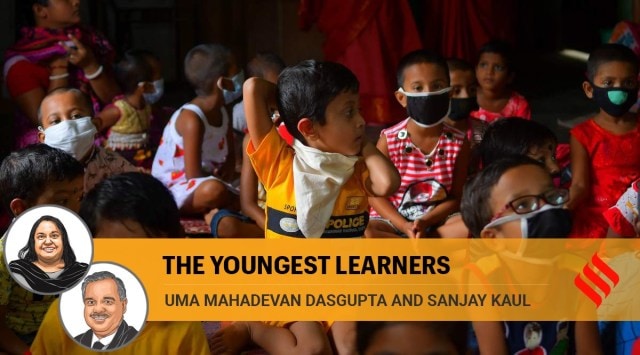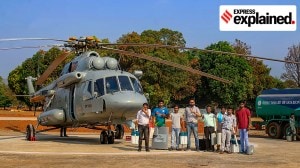- India
- International
Anganwadis should provide early childhood care and education
🔴 Sanjay Kaul, Uma Mahadevan-Dasgupta write: This is necessary for the well-being of the millions of young children in low-income households
 Children wear mask at an anganwadi on the outskirts of Agartala in 2020. (Express Photo: Abhisek Saha, File)
Children wear mask at an anganwadi on the outskirts of Agartala in 2020. (Express Photo: Abhisek Saha, File)The National Education Policy, 2020 has rightly highlighted the importance of early childhood care and education (ECCE), vital for the young child’s early cognitive, social, and emotional development. However, the National Family Health Survey-5 (NFHS-5) finds only 13.6 per cent of children enrolled in pre-primary schools. Therefore, the nearly 1.4 million anganwadis of the Integrated Child Development Services (ICDS) across India must provide ECCE for the millions of young children in low-income households.
Admittedly, with its overriding focus on health and nutrition, ECCE has hitherto been the weakest link of the anganwadi system. Multiple administrative duties have left anganwadi workers with little time for ECCE.
The existing system at best serves the age group of 3-6 years, ignoring infants and toddlers. Nevertheless, a child’s early learning begins at birth, initially through stimulation, play, interactions, non-verbal and verbal communication, and gradually through observation and cues from the immediate environment and increasingly structured activities. Unfortunately, due to a lack of parental awareness compounded by the daily stresses of poverty, disadvantaged households are unable to provide an early learning environment.
Many low-income families have begun to send their children to low-cost pre-schools. However, these mostly have a developmentally inappropriate teaching approach.
Some educationists have suggested that owing to the high workload of anganwadi workers, ECCE in anganwadis would remain a non-starter — and, therefore, all government primary schools should open pre-primary sections, with anganwadis limiting themselves to the 0-3 age group. This proposal has multiple logistical challenges and is fiscally unsustainable. It would require a massive outlay to build over a million classrooms with a million nursery teachers and helpers — even a conservative estimate would put the additional annual outlay at over Rs 30,000 crore. Moreover, with child stunting levels at 35 per cent in India, would children enrolled in pre-schools not require supplementary nutrition and health monitoring? If so, would the nursery teacher not also get overburdened? More critically, experience suggests that existing government pre-schools are mostly a downward extension of primary school, and do not impart age-appropriate ECCE.

A meaningful ECCE programme in anganwadis is not only a more intelligent and cost-effective strategy but is also feasible to implement through seven concerted actions.
First, to design and put in place a meaningful activity-based ECCE framework that recognises the ground realities with autonomy to reflect the local context and setting.
Second, routine tasks of anganwadi workers can be reduced and non-ICDS work, such as surveys, removed altogether. Many anganwadi helpers have studied upto matriculation. With training and an additional incentive, helpers can be redesignated as childcare workers and handle routine work.
Third, anganwadi hours can be extended by at least three hours by providing staff with an increase in their present remuneration, with the additional time devoted for ECCE. Karnataka has already taken the lead; its anganwadis work from 9.30 am to 4 pm. This will have the added benefit of serving as partial daycare, enabling poor mothers to earn a livelihood.
Fourth, ICDS needs a change in policy mindset, both at central and state levels, by prioritising and monitoring ECCE. This will additionally require all ICDS functionaries to be fully trained in ECCE, including assessment through group activities and child observation.
Fifth, anganwadi workers must be re-oriented to closely engage with parents, as they play a crucial role in the cognitive development of young children. Responsive parenting requires both parents to play an active role in ECCE activities at home; therefore, anganwadi workers should be asked to consciously engage with fathers too. Appropriate messaging and low-cost affordable teaching materials can be designed and made accessible to parents.
Sixth, ICDS must supply age-appropriate activity-based play material in adequate quantities regularly, and anganwadi workers encouraged to utilise them in a liberal manner.
Finally, states should invest in research and training to support early childhood education, and ensure that the ECCE programme is not a downward extension of school education.
This column first appeared in the print edition on January 29, 2022 under the title ‘The youngest learners’. Kaul is an ex-IAS officer and former secretary, school education, Karnataka. Mahadevan-Dasgupta is an IAS officer and former principal secretary, women and child development, Karnataka
40 Years Ago
EXPRESS OPINION
Best of Express
More Explained
Apr 18: Latest News
- 01
- 02
- 03
- 04
- 05










































